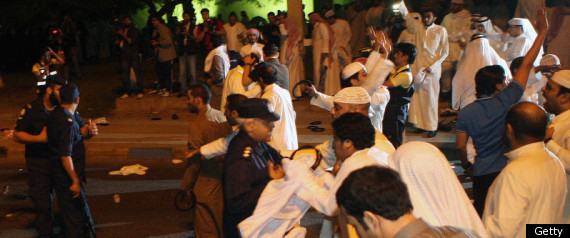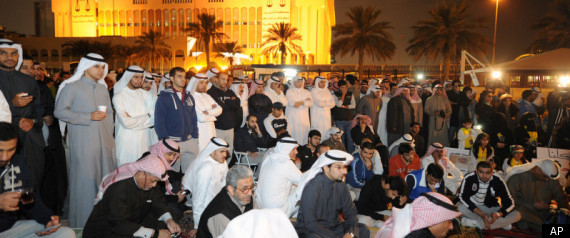Kuwait: Parliament Stormed, Warnings Of Growing Political Crisis

Kuwait: Parliament Stormed, Warnings Of Growing Political Crisis

KUWAIT CITY -- Opposition lawmakers warned Wednesday of a growing political crisis after dozens of anti-government protesters muscled their way into Kuwait's parliament during debate over efforts to question the prime minister about corruption allegations.
Local media reported the demonstrators briefly chanted before being forced out as hundreds of others protested outside.
Opposition parliament members have sought to question Prime Minister Sheik Nasser Al Mohammad Al Sabah over claims that government officials illegally transferred money to accounts outside the Gulf country. Last month, Kuwait's foreign minister resigned as the scandal grew.
Pro-government lawmakers managed to vote down a request for the questioning, but opposition groups filed another motion to force another debate later this month.
Kuwait's key affairs are run by the ruling Al Sabah family, but it has one of the region's most politically active parliaments.
The prime minister has survived votes of confidence in parliament in the past and Kuwait's ruling system does not appear in jeopardy from the opposition groups, which include Islamist parties and others.
But it highlights the rising political tensions inside the strategic Western ally, which could host thousands more U.S. soldiers under a Pentagon proposal to strengthen Gulf forces following the withdrawal from Iraq.
Last months, Kuwait was hit by a wave of strikes that grounded the state airline and threatened to disrupt oil shipments.
Kuwait has not been hit by major pro-reform demonstrations inspired by Arab uprisings, but the tiny Gulf nation stands out in the region because of its hardball political atmosphere. Kuwait's parliament has the most powers of any elected body in the Gulf, and opposition lawmakers openly criticize the ruling family.
In January, Kuwait's emir, Sheik Sabah Al Ahmed Al Sabah, ordered 1,000 dinar ($3,559) grants and free food coupons for every Kuwaiti. Those handouts have been since dwarfed by other Gulf rulers trying to use their riches to dampen calls for political reform. Saudi Arabia's King Abdullah has pledged about $93 billion for more government sector jobs and services. Last month, Qatar announced pay and benefit hikes of 60 percent for public employees and up to 120 percent for some military officers.
Kuwait: Parliament Stormed, Warnings Of Growing Political Crisis




